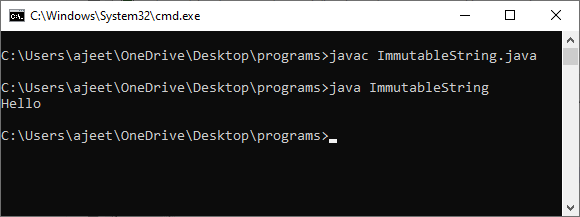What Is Unalterable Strings and Just How It Works
In the realm of shows, comprehending the principle of unalterable strings is paramount for developing safe and robust applications. Immutable strings refer to strings that can not be modified after they are created, making certain data honesty and predictability within the code.
The Basics of Unalterable Strings
Unalterable strings, as a basic concept in programming, are character sequences that can not be transformed when they are produced. This means that as soon as a string is appointed a worth, that value can not be modified. In languages like Python and Java, strings are unalterable objects, bring about different implications in regards to memory administration and information honesty.
Among the key benefits of immutable strings is that they give a complacency in data manipulation. Considering that the content of an immutable string can not be modified, it guarantees that the original information continues to be undamaged, reducing the danger of unintentional adjustments during program implementation (Why are strings immutable in Java?). This residential or commercial property likewise streamlines debugging procedures, as designers can trust that as soon as a string is defined, its worth will not be accidentally modified
Additionally, unalterable strings facilitate reliable memory use. When a new string is produced based upon an existing one, rather than changing the initial string, the new worth is stored separately. This method enhances performance by reducing memory fragmentation and simplifying memory allocation processes. Overall, understanding the basics of immutable strings is essential for grasping programs principles and maximizing code performance.
Benefits of Unalterable Strings
Structure upon the safety and effectiveness benefits of immutable strings, their advantages include improving code integrity and streamlining concurrent shows jobs. By being immutable, strings can not be modified after development, which eliminates the risk of unexpected changes in the information they store. This fundamental immutability makes sure that as soon as a string is developed, its worth continues to be continuous throughout the program's implementation, decreasing the chances of insects triggered by unexpected alterations.
Additionally, unalterable strings add to code reliability by making it simpler to reason regarding the state of a program. Because strings can not be altered, developers can trust that a string will certainly always hold the exact same worth, streamlining debugging and upkeep initiatives. This predictability leads to a lot more secure and reputable codebases.
Execution in Programs Languages
Within numerous programming languages, the incorporation of unalterable strings is a basic aspect that affects exactly how information is taken care of and manipulated within code structures. The application of unalterable strings varies across various programming languages, with each language providing its very own devices to sustain this concept.

In comparison, languages like C and C++ do not have integrated assistance for unalterable strings. Developers in these languages should by hand carry out immutability by applying regulations within their code to avoid straight adjustments to string objects.
Ideal Practices for Collaborating With Immutable Strings
When handling unalterable strings in programs languages like Java and Python, adhering to finest methods guarantees efficient and safe and secure data control. One of the crucial best practices is to make use of StringBuilder or his explanation StringBuffer rather than straight manipulating strings, especially when taking care of considerable concatenation operations. These courses offer mutable choices for string manipulation, helping to stay clear of unnecessary memory allowances and boosting performance.
Additionally, when functioning with sensitive data such as Learn More Here passwords or API keys, it is vital to avoid storing them as ordinary text in immutable strings. Using safe storage mechanisms like char arrays or specialized libraries for managing delicate info aids mitigate safety dangers connected with immutable strings.
Real-world Applications and Instances
Discovering functional implementations of immutable strings in various industries reveals their significant impact on information stability and system dependability. In the health care industry, unalterable strings play a crucial duty in ensuring the safety and security and confidentiality of person information. By stopping unauthorized modifications to delicate details such as clinical records and prescriptions, immutable strings assist keep compliance with rigorous privacy guidelines like HIPAA.
Monetary institutions additionally profit from the immutable nature of strings to boost the protection of consumer data and deal documents. Immutable strings aid stop fraudulence and unauthorized alterations to economic info, offering a robust defense versus cyber threats and making certain the trust fund and confidence of customers.
Verdict
Best techniques for functioning with unalterable strings include avoiding direct modifications and making use of techniques that return brand-new string things. Real-world applications of unalterable strings include data security, caching, and string control jobs.
Unalterable strings refer to strings that can not be changed after they are created, ensuring information stability and predictability within the code. When a brand-new string is created based on an existing one, instead than customizing the initial string, the new value is view kept independently.In languages like Java and Python, strings are unalterable by default, meaning that when a string things is created, its value can not be altered - Why are strings immutable in Java?. Best practices for working with unalterable strings include preventing direct adjustments and making use of approaches that return brand-new string objects. Real-world applications of unalterable strings include data security, caching, and string control jobs
Comments on “Why Are Strings Immutable in Java? Vital Understanding for Designers”